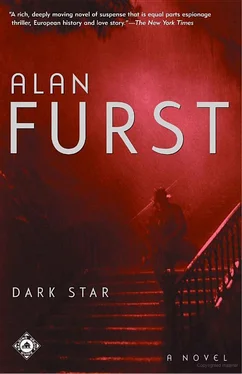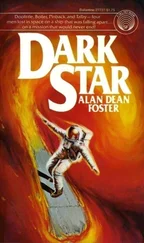Alan Furst - Dark Star
Здесь есть возможность читать онлайн «Alan Furst - Dark Star» весь текст электронной книги совершенно бесплатно (целиком полную версию без сокращений). В некоторых случаях можно слушать аудио, скачать через торрент в формате fb2 и присутствует краткое содержание. Жанр: Шпионский детектив, на английском языке. Описание произведения, (предисловие) а так же отзывы посетителей доступны на портале библиотеки ЛибКат.
- Название:Dark Star
- Автор:
- Жанр:
- Год:неизвестен
- ISBN:нет данных
- Рейтинг книги:3 / 5. Голосов: 1
-
Избранное:Добавить в избранное
- Отзывы:
-
Ваша оценка:
- 60
- 1
- 2
- 3
- 4
- 5
Dark Star: краткое содержание, описание и аннотация
Предлагаем к чтению аннотацию, описание, краткое содержание или предисловие (зависит от того, что написал сам автор книги «Dark Star»). Если вы не нашли необходимую информацию о книге — напишите в комментариях, мы постараемся отыскать её.
Dark Star — читать онлайн бесплатно полную книгу (весь текст) целиком
Ниже представлен текст книги, разбитый по страницам. Система сохранения места последней прочитанной страницы, позволяет с удобством читать онлайн бесплатно книгу «Dark Star», без необходимости каждый раз заново искать на чём Вы остановились. Поставьте закладку, и сможете в любой момент перейти на страницу, на которой закончили чтение.
Интервал:
Закладка:
The job he set himself was like adding columns of figures-but it was this very exercise in brainless transposition that raised the answer above the horizon. Szara was accustomed to writer’s thinking: the flash of insight or the revealing perspective produced by the persistent mind. Copying, he’d thought, was idiot’s work. So now he learned a lesson.
To organize the effort he began at the beginning and proceeded, in a table of events, week by week, month by month. Without really meaning to, he’d fashioned what intelligence officers called a chron, short for chronology. For in that discipline what and who were of great interest, but it was often when that produced usable information.
Before the revolution, Bolshevik contact with the Okhrana was common enough. Between revolutionaries and government special services there is almost always a relationship, sometimes covert, sometimes not. It might be said that they spend so very much time thinking and scheming about each other that it becomes their inevitable destiny to meet, and both write such connections off to intelligence gathering. The illusion of virginity is thereby maintained.
But DUBOK far exceeded the bounds of normalcy in this relationship, bought his safety with his comrades’ lives, and was nurtured by the Okhrana like the most tender sprout imaginable. For him they duplicated the grim reality of the revolutionary experience but took care to buffer it, to draw its teeth. He went, like all the underground operatives, to jail and, like many others, escaped. But duration told the tale. They put him in Bailov prison, in Baku (he spent his time learning German), but had him out four months later. Exile, too, he had to experience, but it was to Solvychegodsk they sent him, in the north of European Russia, and not to Siberia. And he “escaped” after only four months. Lucky, this DUBOK. Two years later he was “caught” again, then sent to finish his term in Solvychegodsk but tired of it after six months: long enough to hear what other exiles had to say, long enough to maintain his credibility as a Bolshevik operative, then, a man on a string, home again.
DUBOK, it became clear, was a criminal, was possessed of a criminal mind. His method never varied: he softened those around him by saying what they wanted to hear-he had a superb instinct for what that might be-then sacrificed them as necessary. He exploited weakness, emasculated strength, and never hesitated to indulge his own substantial cowardice. The Okhrana officer, Szara came to realize, manipulated DUBOK effortlessly because of a lifetime spent in the company of criminals. He understood them, understood them so well that he’d come to feel a sort of sorrowful affection for them. With time he developed the instincts of a priest: evil existed; the task was to work productively within its confines.
The officer, if one read between the lines, was profoundly interested in DUBOK‘s effect on Bolshevik intellectuals. These men and women were often brilliant, knew science, languages, poetry, philosophy. DUBOK, for them, was a kind of symbol, a beloved creature from the lower depths, an enlightened thug, and their comradeship with him confirmed them as members of a newly reordered society. A political scientist, a philosopher, an economist, a poet, could only make revolution if they shared their destiny with a criminal. He was the official representative of the real world. Thus they advanced his standing at every opportunity. And DUBOK knew it. And DUBOK loathed them for it. Understanding condescension with every bone in his body, taking revenge at his leisure, proving that equality was in their minds, not his, as he obliterated them.
Now Szara had known from the beginning he had in his hands a Georgian and, when his perfectly capable mind finally bothered to do arithmetic, a Georgian at least fifty-five years old with a history of revolutionary work in Tbilisi and Baku. It could have been any one of a number of candidates, including the leaders of the Georgian khvost, but, as Szara worked laboriously through the dossier, these were eliminated by DUBOK himself. For the benefit of the Okhrana, DUBOK had written out a description of his friend Ordjonikidze. Eighteen months later he mentioned the Armenian terrorist Ter Petrossian, seen taking part in a bank “expropriation” in Baku; referred, a few pages later, to the good-natured Abel Yenukidze; and spoke harshly against his hated enemy, Mdivani. In May of 1913, he was pressed to organize a situation in which the revolutionary Beria might be compromised, but DUBOK never quite managed to do more than talk about that.
After a day and a half, Andre Szara could no longer avoid the truth: this was Koba himself, Iosif Vissarionovich Dzhugashvili, son of a savage, drunken cobbler from Gori, the sublime leader Stalin. For eleven years, from 1906 to 1917, he had been the Okhrana’s pet pig, snouting up the most rare and delicious truffles that the underground so thoughtlessly hid from its enemies.
This room, Szara thought, staring out at the gray sky over Berlin, too much happens in it. He rose from the desk, stretched to ease his back, lit a cigarette, walked to the window. The lady in silks was rustling about downstairs, doing whatever mysterious things she did all day. Below, on the sidewalk, an old man was holding the leash of a grizzled Alsatian dog while it sprayed the base of a street lamp.
Szara spent part of Sunday morning removing a soiled sheet of cotton cloth that sealed the back of Huldigung der Naxos, then distributing the sheets of the Okhrana dossier across the back of the painting itself, securing them with brown cord tied off to the heads of tiny nails he pounded in with a tack hammer. The cotton cloth he refitted with great care, the bent nails installed by the original framer repositioned in the dents and rust tracks they’d formed over the years. The weight of the heavy gilded frame concealed the presence of the paper, he thought, and a hundred years from now, some art restorer …
On Monday he was, for the first time, onstage as a German, speaking with slow deliberation, purging the Yiddish lilt from his accent, hoping to pass for a mildly unusual individual born somewhere far away from Berlin. He found that if he combed his hair straight back off his forehead, tied his tie very tight, and carried his chin in a position that, to him, felt particularly high, the disguise was credible. He took the name Grawenske, suggesting distant Slavic or Wendish origins, not at all uncommon in Germany.
He telephoned the office of an auctioneer and was given the name of a warehouse that specialized in the storage of fine art (“Humidity is your enemy!” the man told him). Herr Grawenske appeared there at eleven promptly, explained that he was joining the accounting staff of a small Austrian chemical company in Chile, muttered about his wife’s sister who would be occupying his residence, and left Professor Ebendorfer’s masterpiece in their care, to be crated, then stored. He paid for two years, a surprisingly reasonable amount of money, gave a fictitious address in Berlin, and was handed a receipt. The remainder of the officer’s effects, and the fine satchel, were distributed to shops that supported charity missions.
Marta Haecht had given him the phone number at the little magazine where she “helped out the art director.” Szara tried to call several times, chilled to the bone as the flat Berlin dusk settled down on the city. The first time, she’d gone on an errand to the printers’. The second time, somebody giggled and said they didn’t know where she’d gotten to. On the third try, close to quitting time, she came to the phone.
“I’m leaving tomorrow,” he said. “May I see you tonight?”
“There is a dinner. My parents’ wedding anniversary.”
Читать дальшеИнтервал:
Закладка:
Похожие книги на «Dark Star»
Представляем Вашему вниманию похожие книги на «Dark Star» списком для выбора. Мы отобрали схожую по названию и смыслу литературу в надежде предоставить читателям больше вариантов отыскать новые, интересные, ещё непрочитанные произведения.
Обсуждение, отзывы о книге «Dark Star» и просто собственные мнения читателей. Оставьте ваши комментарии, напишите, что Вы думаете о произведении, его смысле или главных героях. Укажите что конкретно понравилось, а что нет, и почему Вы так считаете.












